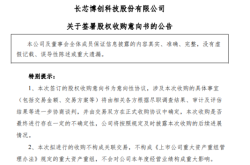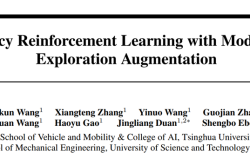National Day holiday, disappearing internet celebrity cities
![]() 10/08 2024
10/08 2024
![]() 711
711

Editor | Jiran
The fiery National Day holiday is drawing to a close, but strangely, few internet celebrity cities have seen a surge in popularity during this year's holiday.
According to the "Baidu Map 2024 National Day Travel Tips," Hangzhou's Qiandao Lake and Aba's Siguniang Mountain are among the top 10 domestic popular scenic spots, while Gannan in Gansu and Tengchong in Yunnan are among the top 10 niche tourist cities nationwide.
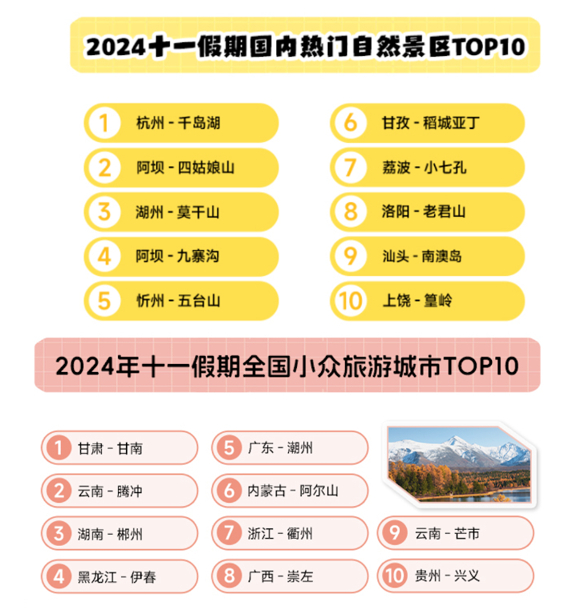
Source: "Baidu Map 2024 National Day Travel Tips"
Many internet celebrity cities that have gained popularity in the past have seen an increase in tourist traffic during this year's National Day holiday, but there is still a significant gap compared to their peak periods.
On the first day of the National Day holiday, approximately 32,000 passengers were sent and arrived at Zibo Station. In comparison, during the peak popularity of Zibo's barbecue in April 2023, Zibo Station set a record of nearly 84,000 passengers being sent and arrived in a single day. Not only Zibo, but Kaifeng, Tianshui, and Heze have also seen a significant gap between their National Day holiday popularity and peak periods. The popularity of Kaifeng and Tianshui has even followed an inverted V-shaped curve.
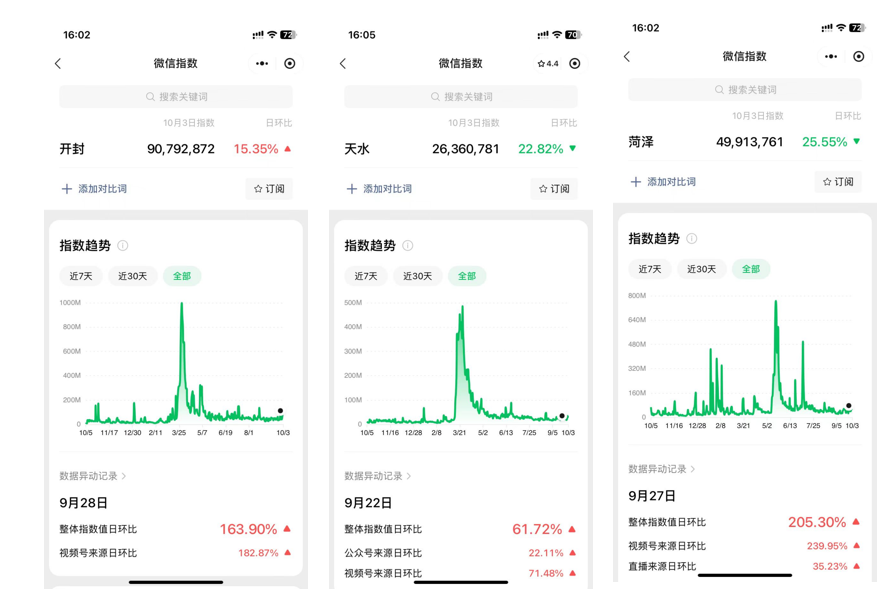
Source: WeChat Index
Behind the lack of visibility of internet celebrity cities during the National Day holiday lies the emerging turning point in their development.
In recent years, domestic internet celebrity cities have developed in a relay-like manner. From Changsha and Yiwu in 2020 to Caoxian and Hengdian in 2021, from the "Village BA" in Taijiang County, Guizhou Province, in 2022 to Zibo's barbecue in 2023, and this year to Harbin, Tianshui, Changchun, Kaifeng, Heze, and Altay, internet celebrity cities have shown a trend of "one after another takes the stage." However, on the one hand, many internet celebrity cities have encountered the dilemma of "crowded but not prosperous." Taking Q1 2024 as an example, Harbin's economic growth rate of 3.7% ranked last among the four major cities in Northeast China, while Tianshui's growth rate of 4.3% was not only lower than the province's average of 5.9% but also ranked fourth from the bottom among the 14 cities and prefectures in Gansu Province.
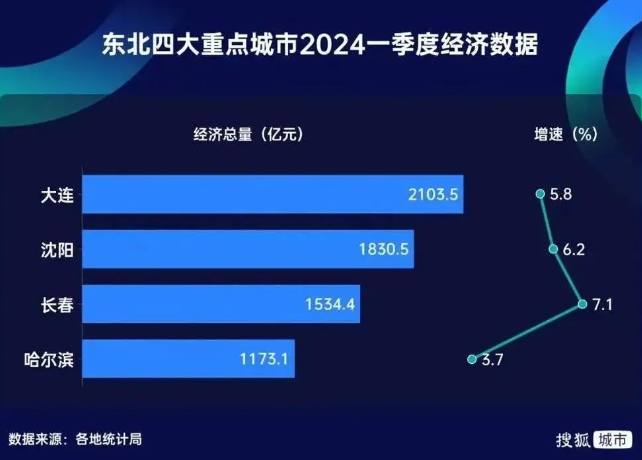
Source: Sohu City
The reason for this is that the tourism industry has limited economic stimulus compared to heavy industry. According to the National Bureau of Statistics, the added value of the tourism and related industries nationwide in 2019 was 4.4989 trillion yuan, accounting for only 4.56% of GDP. Moreover, internet celebrity cities attract more young people, but under the shoestring budget travel model of "per capita 300 yuan for a two-day, one-night trip to Zibo" and "special forces-style tourism," their impact on the local economy is less pronounced.
On the other hand, the lifespan of internet celebrity city IPs is getting shorter and shorter, and those driven by individual IPs have an even shorter lifespan. For example, the popularity of Kaifeng's Wangpo IP lasted for about 30 days, while Guo Youcai's IP popularity lasted only 12 days. Why is it difficult for internet celebrity cities to maintain their popularity for a long time? What kind of performance did internet celebrity cities show during this year's National Day holiday?
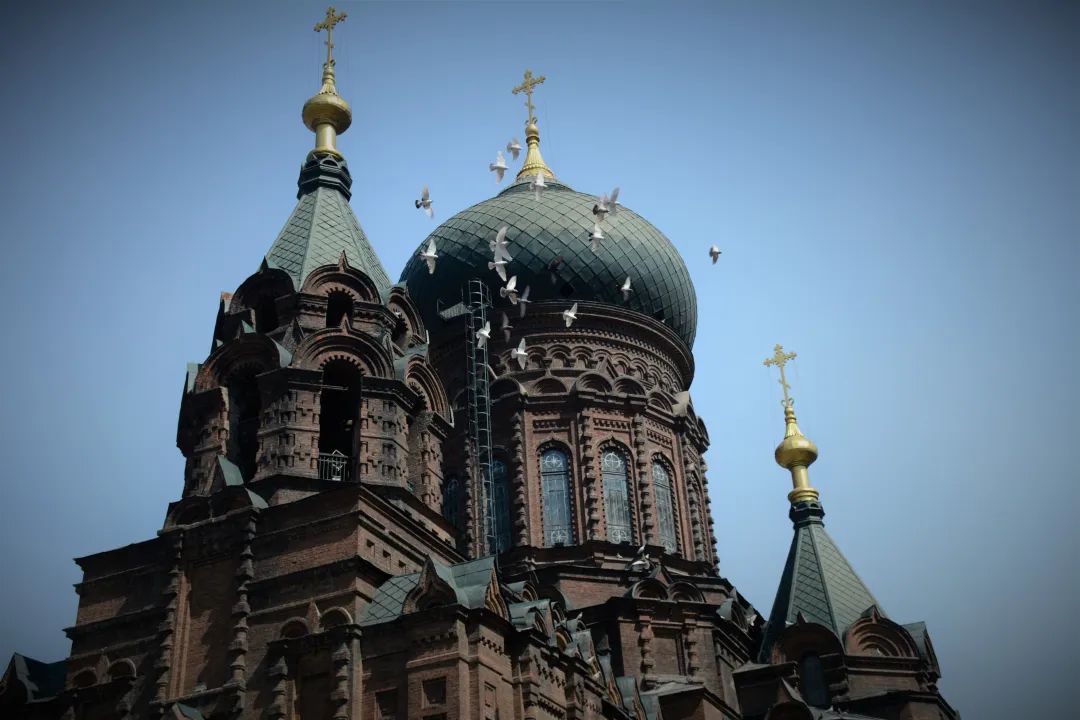

Reverse travel, family travel, and outbound travel became the three major focuses of National Day travel
Life is like a besieged fortress, where those outside want to get in, and those inside want to get out. During the National Day holiday, young people escaping from high-tier cities have continued the popularity of county tourism from the May Day holiday. According to Ctrip data, county-level cities and towns such as Anji, Pingtan, and Jinghong saw order growth rates of 86%, 67%, and 50% respectively on the first day of the National Day holiday, with overall county tourism and rural tourism order growth rates of 20% and 60% respectively.
Not only was the tourism market booming, but some offline businesses in county markets were also thriving. Wanda Plaza in Taihe County, Anhui Province, chose to open on the first day of the National Day holiday, attracting many young people from surrounding counties. Official data showed that the store had 350,000 visitors on opening day, with a turnover of 9.97 million yuan.
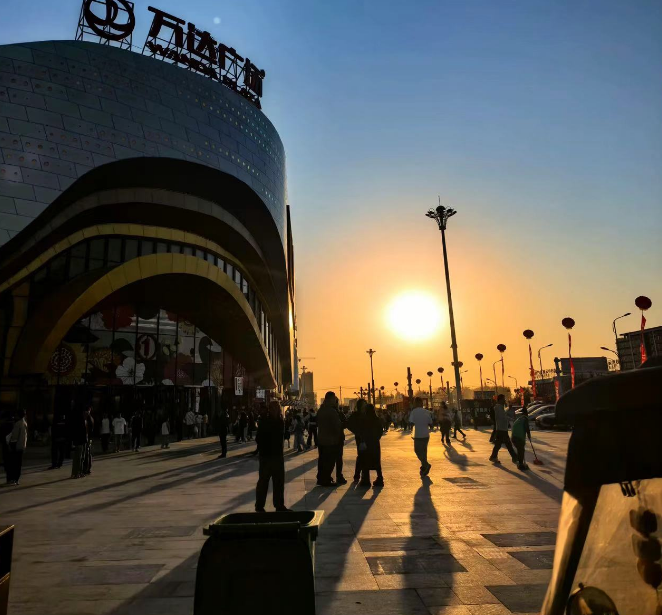
Source: Author's photo
While young people in high-tier cities experience the hustle and bustle, local customs, and human touch of lower-tier markets, young people in small towns are experiencing the sleepless neon lights of high-tier cities, coupled with the decline in airfare and hotel prices during this year's National Day holiday.
According to Fliggy's "2024 National Day Holiday Travel Trends," the average prices of domestic and international hotels during this year's National Day holiday decreased by approximately 4.5% year-on-year.
Ctrip's "2024 National Day Tourism Forecast Report" showed that domestic and outbound airfare prices during the National Day holiday decreased by more than 20% compared to the same period last year, maintaining the popularity of high-tier city tourism. In particular, the flag-raising ceremony at Tiananmen Square and the successful application for World Heritage status of Beijing's central axis on the first day of the National Day holiday made Beijing the top destination among high-tier cities.

Source: CCTV Finance
The "reverse tourism" of young people in high-tier cities and small-town youth during the National Day holiday appears to be a personal choice on the surface, but it reflects society's emphasis on specific values and lifestyles. On the one hand, young people in big cities often feel lost and alienated due to the fast-paced and stressful work and living environments. This sense of alienation stems from the "instrumentalization" of urban life, where individuals are viewed as tools to achieve certain production goals rather than as individuals pursuing self-realization.
During the National Day holiday, young people in high-tier cities seek to restore their sense of self and find meaning in life amidst natural and peaceful environments. Meanwhile, young people from small towns travel to big cities in search of self-discovery on another level – they hope to find their own identity and future direction by exposing themselves to a broader world.
On the other hand, holidays are essentially tools for "consumption reproduction." Young people in high-tier cities showcase their taste for life and pursuit of "low-consumption, slow-paced living" by sharing natural scenery and simple lifestyles in county towns. Meanwhile, young people from small towns accumulate symbolic capital by experiencing and showcasing modern city life, satisfying their desire for social mobility and enhancing their social status through consumption of modern symbols. The "identity swap" between young people in high-tier cities and small towns gradually breaks down the urban-rural dual structure while providing more imagination space for the penetration of numerous brands.
In addition to the booming tourism market centered on young people, the growing number of children and young adults are becoming important consumer forces in National Day tourism. According to Ctrip's "2024 National Day Tourism Forecast Report," family travel accounted for more than 30% of all travel, with orders for study tours increasing by more than 40%. The promotion of family and study tours is not only an important factor driving the popularity of high-tier cities but also makes grotto tours, which are rich in historical and cultural heritage, a "dark horse" in this year's National Day tourism market. Datong's Yungang Grottoes in Shanxi Province received a total of 159,612 visitors in the first three days of the National Day holiday, an increase of 44.69% year-on-year, setting a new record high.
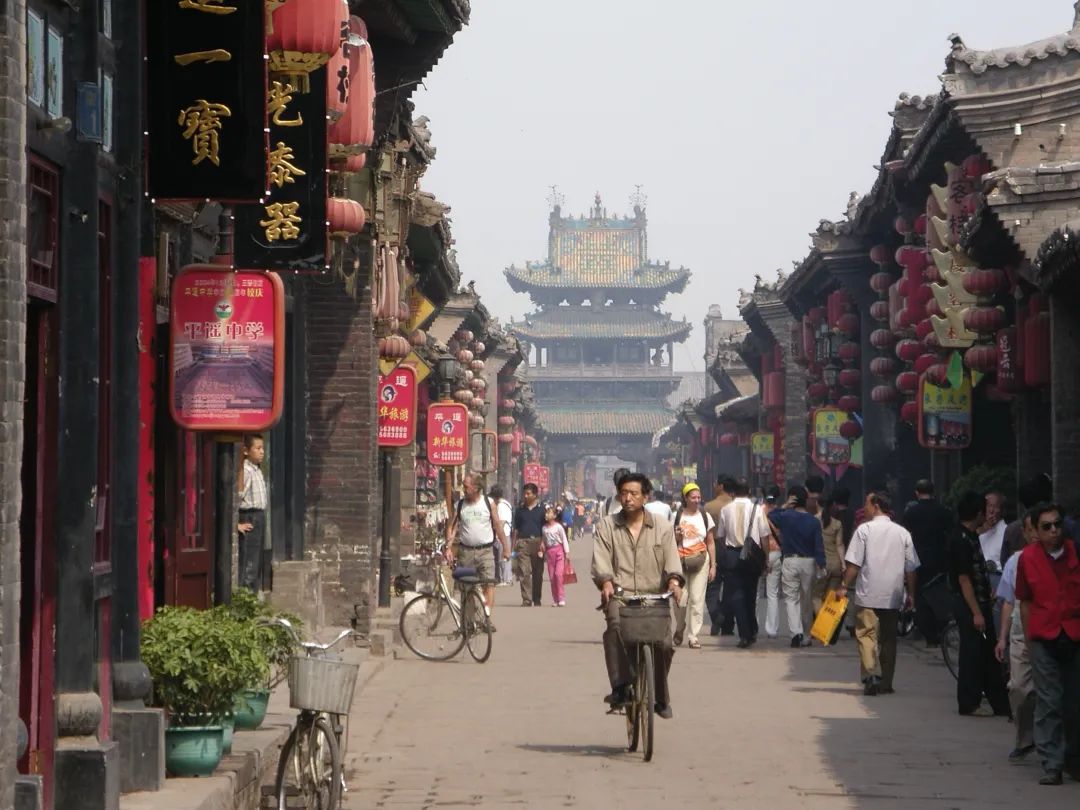
Pingyao, Shanxi Province
Even after the National Day holiday, the family and study tour markets remain strong. In addition to fulfilling parents' desire for interaction and companionship with their children, these tours also reflect parents' long-term investment in their children's future competitiveness through early "experiential education" to broaden their horizons and avoid being constrained by social mobility within a certain class.
Moreover, in today's era of information diversity, fragmentation, and screen-based media, many parents are concerned that their children lack in-depth understanding and experience of knowledge. They prefer personalized education, and family and study tours allow children to gain a deeper understanding of knowledge through practical experience.
This kind of hands-on experience has become increasingly scarce and valuable in the digital age. Business Insights Consulting predicts that the domestic study tour market size may exceed 304.1 billion yuan by 2028. In addition to the booming domestic tourism market, the recovery of international flights and the decline in international airfare prices have brought the peak of cross-border travel during the National Day holiday.
According to FlightMaster data, during the National Day holiday in 2024, civil aviation is expected to operate 13,000 international flights, recovering to 85.5% of the level in 2019. Among the top 20 countries, countries such as Malaysia, the United Kingdom, the United Arab Emirates, Italy, Laos, and Qatar have exceeded their 2019 flight frequencies.
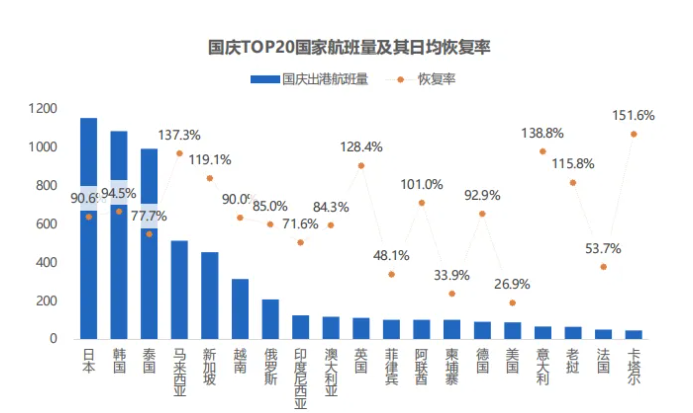
Source: FlightMaster

Increasingly symbolic internet celebrity cities
In addition to the increasing personalization, internationalization, and niche trends in the National Day tourism market, which have impacted the flow of people to internet celebrity cities, the emergence of numerous internet celebrity cities since 2020 can be attributed to two main factors. Firstly, various technologies, represented by metaverse, digital twin, and virtual reality technologies, have gradually matured and are widely used in films, television, and games.
For example, the game production team behind "Black Myth: Wukong" utilizes professional spatial computing and motion capture technology services to scan real-world objects and landscapes, combined with ray tracing technology, to create life-like graphics and images.
The continued popularity of "Black Myth: Wukong" has maintained the heat of many scenic spots in Shanxi during the National Day holiday. According to Ctrip data, travel bookings in Shanxi Province increased by 63% in the first three days of the National Day holiday compared to the Mid-Autumn Festival, with bookings up 171% in terms of value. Multiple scenic spots, including Xiaoxitian Scenic Area in Xi County, the Jin Ancestral Temple Museum, and Wutai Mountain Scenic Area, had to stop selling tickets due to an influx of visitors exceeding their capacity.
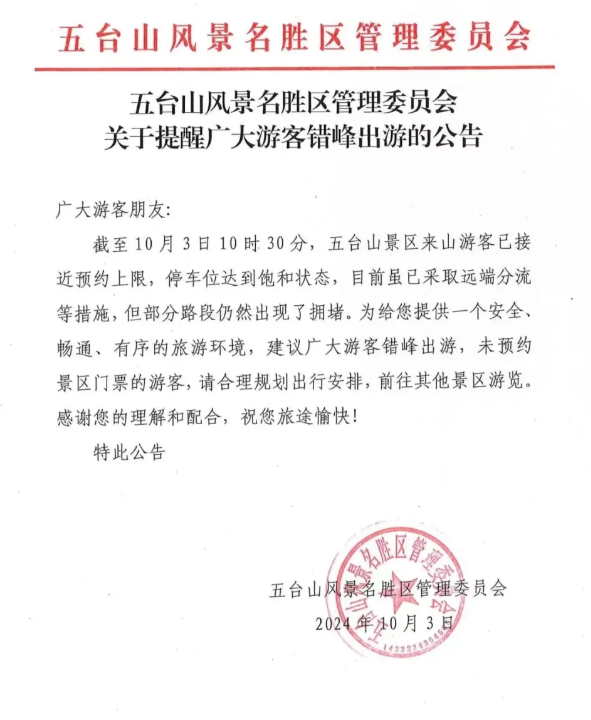
Source: Wutai Mountain Scenic Area Official
Secondly, social media platforms such as Douyin, Kuaishou, and Xiaohongshu have gradually entered a high-penetration era since 2020. For example, Douyin has changed the traditional model of cities gaining fame and attracting tourists through long-term cultural accumulation, historical stories, and humanistic development by monopolizing tags, traffic entry points, and targeting specific groups through an algorithm system similar to a horse race mechanism. As mentioned above, Tianshui's spicy hot pot, Kaifeng's Wangpo, and Heze's Guo Youcai all gained popularity on Douyin, with more and more netizens sharing and spreading their content, expanding the reach of these cities on the platform and laying the foundation for their subsequent popularity.
However, the high penetration of social media has led to a shift in information dissemination in the post-truth era, with a growing tendency towards shallow information and instant sensory stimulation, neglecting in-depth analysis and understanding, and forming information silos.
Many domestic internet celebrity cities quickly gain popularity often rely on instant visual impact rather than deep cultural resonance. Tourists are attracted by the external symbols of these cities but fail to truly experience their historical, cultural, and intrinsic values. This cultural superficiality makes it difficult for internet celebrity cities to maintain long-term attractiveness.
After all, the lack of cultural connotation behind these cities cannot resonate with tourists for a long time. In particular, cities that rely on individual IPs, such as "Snow Cake Hou," Kaifeng's Wangpo, and Heze's Guo Youcai, are vulnerable to fluctuations in popularity due to the uncertainty and uncontrollability of individual IPs. Furthermore, as traditional value systems and social structures gradually disintegrate in postmodern society, individual identity is no longer tied to stable occupations, families, or social roles but becomes more fluid and uncertain. This leads to identity anxiety among many people who are unsure of their place in society and how to achieve stable self-identity. The instantaneity and fragmentation of social media information make people's emotional connections and social identities more dependent on external validation.
Based on this, "rough life, luxurious social media" has become the travel status quo for many young people today. Rough life and luxurious social media correspond to the ideal self and real self mentioned in psychology. Many tourists in internet celebrity cities try to showcase their "ideal self" – a successful, fashionable, and trendy image – through brief check-ins and shares. This may explain why a surge of tourists floods into a city shortly after it becomes popular, and why numerous related notes, videos, and travel guides appear on social media in a short period.
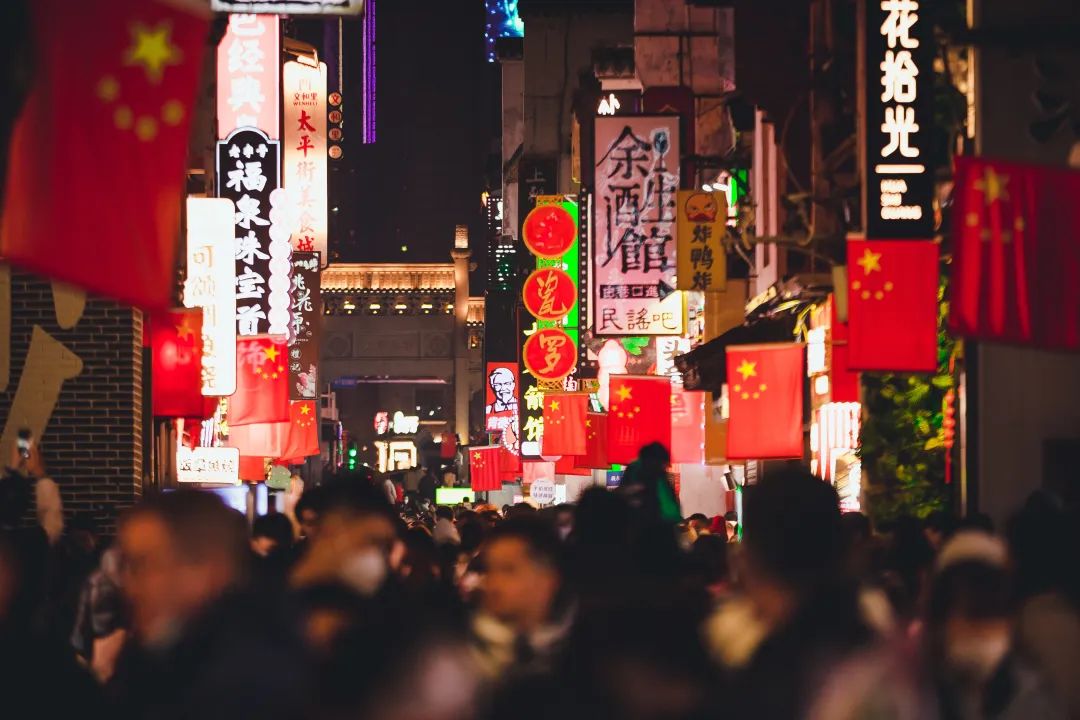
Taiping Street, Changsha
This display is often far removed from their real-life situations, and the superficial display not only fails to conceal their inner confusion and uncertainty but instead exacerbates their internal conflicts. Once the contradiction between their ideal self and real self becomes irreconcilable, the appeal of internet celebrity cities to them disappears, as these cities cannot provide true self-realization but only temporary psychological escape.
Based on this, many internet celebrity cities can fall into a vicious cycle of "social media traffic growth → driving offline tourist growth → localities enhancing tourist services and experiences through multiple measures, with increased media attention continuing to drive tourist growth → declining user attention and tourist decline → leaving a mess behind for the locals."

How to transition from "short-term popularity" to "long-term success"?
Looking ahead, internet celebrity cities face considerable resistance in breaking this vicious cycle. Firstly, after becoming popular, excessive commercialization leads to poor tourist experiences, which, in an era where consumers increasingly prioritize cost-effectiveness, continuously affects tourists' willingness to spend. This is indirectly evidenced by the sustained losses incurred by cultural tourism companies nationwide. The listing announcement of Chongqing United Exchange shows that from 2021 to 2023, the net profit of Hongyadong Cultural Tourism was only 58,900 yuan, -3.4346 million yuan, and -1.5788 million yuan, respectively.
In the first half of this year, Zhangjiajie Tourism Group's revenue and net profit declined by 2.87% and 49.13% year-on-year, respectively, to approximately 174 million yuan and -61.1629 million yuan. Paradoxically, Zhangjiajie City received a total of 20.6447 million domestic and international tourists, a year-on-year increase of 9.28%.
Similarly, Xi'an Qujiang Cultural Tourism Co., Ltd. achieved a 11.9% year-on-year increase in revenue to 770 million yuan in the first half, but its net profit attributable to shareholders of the listed company was -187 million yuan. Thirdly, behind the monthly changes in internet celebrity cities this year lies the revelation that while social media provides endless possibilities for cities to stand out, the lifecycle of hotspots is very short.
Internet celebrity cities can easily become popular due to a particular topic or attraction, but this popularity is difficult to sustain as new internet celebrity attractions or events quickly attract public attention. Transitioning from traffic-driven tourism to reputation-driven tourism has become another challenge for local cultural and tourism bureaus.
Thirdly, a series of service initiatives launched by Zibo, Harbin, Tianshui, and Heze to enhance tourist experiences after their popularity provide a "formulaic reference" for breaking through the circle of domestic urban tourism in the future. However, the lack of internet celebrity cities during the National Day holiday suggests that consumers are gradually becoming fatigued with these cities. For example, after the popularity of Zibo Barbecue, Tianshui Mala Tang, Kaifeng Wangpo, and Heze Guo Youcai, "replicas" can be found all over the country.
In other words, finding differentiation within this "formula" and returning internet celebrity cities from a check-in attribute to a true tourism attribute may be the top priority for internet celebrity cities to break through their bottlenecks in the future. Of course, the operational thinking of many internet celebrity cities offers new opportunities to break this vicious cycle.
From the perspective of IP operations for internet celebrity cities, these cities often require a continuous stream of IPs to drive popularity, rather than relying on a single IP. For example, in addition to its rich historical and cultural heritage, Xi'an has launched various IPs in recent years, including "Breaking Bowls of Wine," "Songs of Xi'an People," "The Unbalanced Girl," "Everbright City," "Chang'an Twelve Hours," "Thirteen Dynasties Ancient Capital," and "Xi'an Intangible Cultural Heritage."
In terms of satisfying tourist attributes, data from "Baidu Map's 2024 National Day Holiday Travel Guide" shows that Altay-Kanas is the top popular rural tourism destination for the National Day holiday, indicating that Altay's popularity has extended from May to October this year, with a relatively long IP lifespan. Behind this is Altay's natural scenery, which allows travel to truly return to escaping the hustle and bustle, daily routines, releasing oneself, and rediscovering one's true self.
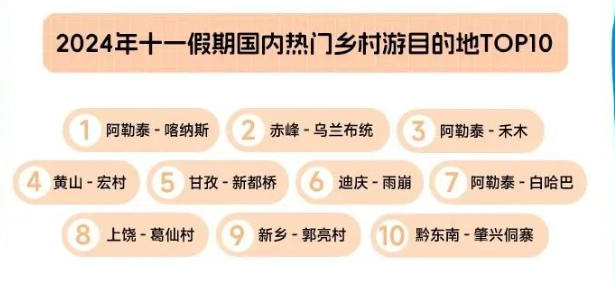
Image source: "Baidu Map's 2024 National Day Holiday Travel Guide"
Similarly, in 2023, Zhao Liying popularized Quanzhou hairpin flowers, which, despite their commercialization, essentially satisfy women's inner pursuit of beauty. In recent years, Jiangxi's Jingdezhen has created IPs such as "Silent Buddha," "Capital of Chinese Ceramics," "Shopping-style Tourism," and "Jing Piao," which seem to align with contemporary public preferences for individuality, culture, emotional consumption, and freedom.
As Professor Wei Xiang of the School of Business, University of Chinese Academy of Sciences, stated, if a city wants to develop tourism, it needs to foster a tourism industry that can drive more efficient and higher-level governance. Cultivating the city's connotation is a long-term strategy, and uniqueness is what attracts people. The charm of internet celebrity cities does not stem solely from one or two brief moments of popularity but is deeply rooted in the comprehensive and integrated development of culture, tourism, cuisine, performing arts, convention and exhibition economy, and sports activities. Only through multi-dimensional coordinated development can a unique and lasting appeal be established.

